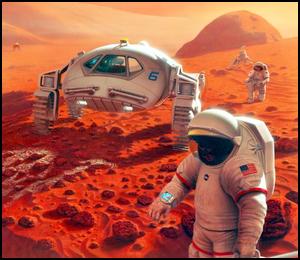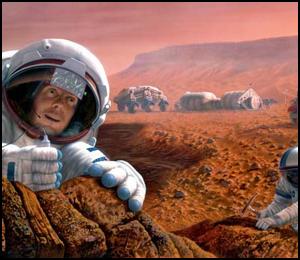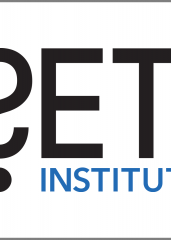Dr. Margaret Race is concerned with protecting the planets - not just Earth, but Mars and beyond. Her work focuses on ensuring that missions to the Red Planet and other Solar System bodies do not inadvertently bring terrestrial microbes along (which would complicate our search for indigenous extraterrestrial life) or return any microbes to Earth (which might be biohazardous). Her research on extraterrestrial organisms is linked closely to her long-time ecological interest in exotic and invasive species on Earth.
Margaret is also actively involved in education on astrobiology and especially likes to work with journalists and educators to develop materials about complex, controversial issues in space exploration and environmental protection. Her enthusiasm is infectious, and her work ensures that our spacecraft are not.
Margaret, explain "Planetary Protection" for us.
Planetary protection applies to biological cross-contamination of planets during space missions. The Outer Space Treaty of 1967 requires space exploration be done in ways that avoid forward contamination (transporting hitchhiker microorganisms from Earth on outbound spacecraft) and back contamination (bringing something back that could be biohazardous to Earth). It doesn't mean we're scared of discovering ET life or that it's like the "Andromeda Strain." Being careful is just a good, conservative, scientific process and it also helps preserve and protect samples in ways that make them maximally useful to scientists.
The international Committee on Space Research (COSPAR) provides a forum for discussions of problems that may affect space research, including planetary protection. More than 90 countries have signed the Outer Space Treaty so any country that launches spacecraft must adhere to those rules. Early discussions about planetary protection actually began around the time of Sputnik, when scientists realized that by launching craft from Earth, we could transport hitchhiker organisms to other places. If we're going to search for life beyond Earth, the last thing we want to do is bring it with us. Not many people are aware that we were concerned about environments off this planet even before we enacted some of our own environmental laws.
In the United States, NASA's Planetary Protection Officer must sign off on all missions and ensure the U.S. adheres to the Outer Space Treaty. Whenever there is a proposed mission anywhere in the Solar System, we have to ask if there are planetary protection implications. For instance, missions that bring samples back from Mars have more rigorous compliance issues than those going to the Moon.
What is your involvement in planetary protection?

I am a policy analyst and ecologist. My work at the SETI Institute is supported by a grant from NASA's Office of Planetary Protection. I also serve as a communication bridge. I don't answer the questions: I ask them, and examine what kind of science and information we need to address them, especially for Environmental Impact Statements. I put the pieces together by soliciting advice and opinions from experts all over the world. As new discoveries are made, such as finding evidence for water on Mars, we need to discuss on an international level whether our existing planetary protection requirements and controls are sufficient. The regulations have been updated many times since 1967, just as the Clean Air and Clean Water Acts get updated.
In addition to analyzing the legal and policy aspects of missions, I've also studied biocontainment and life detection, as well as ethical issues and how they apply to missions. I help determine the best ways to communicate about planetary protection to the public. NASA is committed to informing the public about any and all risks prior to launch and to assuring the public that significant oversight and monitoring are done at all times.
Scientific discussions touch many issues when NASA considers how clean a spacecraft must be -- or how international policies should apply to Mars versus a newly discovered moon like Enceladus, for example. The Treaty says to avoid harmful cross-contamination but it's not simple to determine what that means. It takes scientific studies to determine what is harmful and how clean is clean enough for a spacecraft. We draw from the same biological principles that are used on Earth, considering what type of environmental impact we might create when we move things between planets.
Are there other comparisons between protecting the Earth and outer space?
Definitely yes! In fact, this past year I've looked at the Antarctic Treaty. There are three major areas considered "resources for humankind," to be held in trust for future generations and protected from exploitation by individual nations or corporations. Those resources are the deep oceans, outer space, and Antarctica. By international agreements, we've declared that nobody owns them, no one can plant flags or declare sovereignty, there can be no militarization or nuclearization, and there is high priority given to science, cooperation, and benefits for humankind.
Antarctica was set aside for science and explorers, yet tourist ships are now arriving full of people who want extreme vacations. How do you manage the throngs of visitors while still preserving the environment? In a similar way, we're beginning to think about the space environment. How should we manage the growing desire for space tourism? Or what if someone wants to go to the moon and strip mine it for resources? What regulations would apply? Who would issue the permits? It's important to think about how different activities could affect science and exploration. It's also critical to figure out who should be involved in these discussions besides scientists---- maybe lawyers, ethicists, political scientists, and other disciplines. Lately we've been thinking how to bring them all together for discussions on how to proceed.
You have quite a diverse education and background, including degrees in Biology, Energy Management and Policy, and a Ph.D. from UC Berkeley in Zoology (Ecology). What led to your current scientific focus on planetary protection?
I'm a marine biologist by training. My dissertation work at UC Berkeley (UCB) took place on the tidal flats and marshes of San Francisco Bay while studying mud snails that came from the East Coast to the West Coast by transcontinental railroad. As an ecologist, I focused on what happens when something new is introduced from outside the ecosystem. I later worked in the division of Agriculture and Natural Resources at UCB and asked the same questions related to invasive insects. How does an introduced organism change the ecosystem and what kind of impacts are there? How do we manage the environment? Looking at planetary protection, my questions are still similar: If we disturb the landscape of another planet, what kinds of environmental impact could we cause?
In the mid-80s, I worked on a project involving a UCB researcher who proposed the first deliberate outdoor release of a genetically engineered organism-a microbe. What would happen if it was put outdoors? That research was very interesting to me because it involved elements of basic biology and ecology, science policy, legal issues, environmental impact statements, and communication with the mass media and public.
The elements are similar for astrobiologists. Not only do I consider science and policy, my work has led me to now think at the planetary scale when pondering life. Earth is not just a rocky orb on which things grow. It's a bio-geo-chemical cycling system and everything works together to support life. On this planet, we take our life support systems for granted -- they work without our doing anything or paying anybody! But when you think about human missions to Mars, it's quite different. It's a 3-year mission and it takes 9 months to get there. How are you going to feed the crew? Where do they get their oxygen or water? Where do you put the waste? All of those issues still need to be resolved for a mission with just five or six astronauts. It makes you realize how difficult artificial life support is. We'd be remiss not to think on a planetary scale and work towards sustainability for our own planet.
What if life is discovered somewhere in outer space?

If we were to find life beyond Earth, it would be a huge discovery! The first question will be whether it is microbial or intelligent life and what characteristics it has. Scientifically, we could tell you how significant it is. However, no amount of science is able to tell us what it would mean to us as humans to know we're not alone. Do the views about ET life differ between various cultures, political groups, or religions? How do we take that information and use it? Will that knowledge change us? And what does it say about life in the long run?
All our laws, ethical systems, and religions are based on life as we know it. But what if we find life as we don't know it? What will that mean and how does that change everything on Earth - or not? That is why it's important to bring other disciplines in to think about these questions - and to talk about how we might balance those many different perspectives. I find that fascinating!
What is your biggest challenge?
Overall, I think it's important to convince people that it's not frivolous to think about these topics. It's different than thinking about little green men. What we've learned about astrobiology, extremophile biology, and habitability has given us a lot of information about how human beings work, how ecological systems work, and how our planet works.
What do you enjoy most about your job?
I love the multidisciplinary nature of my job, and I enjoy the fact that I get to work with such a diverse group of really smart people. I tell people, "I'm not a rocket scientist but I get to work with them!" My job has grown into something beyond space missions; it's expanded to include astrobiology and questions about life itself. Are we alone in this universe? Does Earth contain the only examples of life -- or not, and what does that all mean?
I also really enjoy talking with the public and going into classrooms and museums. I emphasize I'm not an astronomer; I'm a biologist, and a mom. When I was a student, my current job didn't exist. This demonstrates to a young audience that they will be faced with opportunities throughout their lives they can't even imagine right now. The best way to position themselves is to become fully educated across multiple areas. I get to "play" in so many areas! I go from cell biology to physiology, to astronauts' health and safety, and to legal, policy and ethical aspects of astrobiology. When I started out, I certainly didn't think that is what I wanted to do, but I like taking all these areas and blending them with up-to-date science.
You are actively involved in education related to astrobiology. Why do you think science education is important?
I feel strongly about the power of education. My dad was the first one in his family to graduate college, so I recognize the power of education. It prepares you to do whatever you want to do. Additionally, I believe science of all sorts touches everybody's lives. Scientists have a responsibility to communicate to the public about their work, and I believe the public deserves to have science explained in a way that is clearly comprehensible.
What first sparked your interest in science in particular?
I've been told that I've always asked questions, and I had a mom and dad who answered them. In sixth grade, I became a competitive swimmer, which led eventually to my learning how to scuba dive. I was also really interested in the environment and outdoors. But, believe it or not, I didn't even discover biology until I was a junior in college.
As a child, what was your dream job?
I wanted to be a marine biologist -- and I got to do it! I've had great times out on ships, scuba diving, and doing outdoor field work. As a girl, I vividly remember going on a school trip to Martha's Vineyard. As I waded into the water, I felt all that goopy muck beneath my feet. I put on my brother's mask and snorkel, looked into the water, and there were schools of tiny fish swimming between my legs and eel grass swaying in the water. It was like a little forest in between my feet. What a wonderful introduction to marine biology!
Who did you admire growing up?
I was an astronaut groupie as a kid. Like everybody in my era, we grew up watching Project Mercury and all the Apollo and Gemini astronauts. My dad worked for General Electric on jet engines, and those engines were used on the helicopters that picked up the astronauts. During the Mercury days, I followed all the early astronauts and I made a scrapbook for Scott Carpenter, who went up after John Glenn. I gave him the book during a visit he made to Boston, and we've remained friends to this day.
What motivates you?
I love what I do!
How do you spend your free time?
I've recently devoted much of my free time to the Lafayette Library and Learning Center. It is a new library that has a consortium of partners, including Lawrence Hall of Science, Chabot Space & Science Center, Lindsey Wildlife Museum, Oakland Zoo, California Shakespeare, St. Mary's College, and the list goes on. I'm on the Board of Trustees, and I'm working on educational programs for the library. Recently the library and a local school have jointly submitted a proposal to NASA that would allow students to participate in a live videoconference with astronauts on the International Space Station. We're linking it to fifth grade curriculum and the Chabot Space & Science Center. We have our fingers crossed.
I also enjoy skiing, hiking, and other outdoor activities that help me stay in shape. In the past couple of years, I co-organized a local book club and it's just wonderful group of working moms - a mix of lawyers, a nutritionist, entrepreneur, financial planner, a realtor and even a biologist - reading all sorts of great books!
What is your philosophy of life?
Lifelong learning. Never stop learning!
Who would you like to swap roles with for a month's time?
I have a private pilot's license and love to fly. I would like to go up in the shuttle or go to the Moon. I wouldn't go to Mars, though, because it's a three-year round trip and I like people, food and the outdoors too much. I don't want to spend my time in a tiny capsule.
What is your favorite vacation destination?
I'm fortunate in that my career has allowed me to travel to six continents - all but Antarctica. Hawaii is a very special place to me - the diving, diversity, food, and outdoors - it has everything! I took a diving trip off the big Island of Hawaii, and I got to swim with turtles, octopus, sharks, manta rays - it was incredible!
Thinking back over the last 20 years of your career, has there been one moment that is particularly memorable?
I was at the World Space Congress conference in 1992, and I was still trying to figure out what an ecologist was doing by dabbling in space exploration. During lunch, we were talking about big problems in the world. I shared my opinion that the biggest environmental problem is nuclear war. One of the astronomers disagreed and said it was Near Earth Objects -- hazardous asteroids and comets that could totally obliterate civilization -- just like the one that wiped out the dinosaurs 65 million years ago. Thinking about life and its fragility beyond this planet was definitely an "aha" moment for me.
What's in store for you in the future?
In terms of my work with the SETI Institute, I hope to continue my work on astrobiology, planetary protection, and societal issues. Last year I organized an interdisciplinary workshop to see if we could build a "roadmap" of Astrobiology and Societal Issues -- there was a resounding yes! We're continuing to work on the framework outlining priority areas of research ahead.
But the effort will take more than scientists - we aim to include a global consortium of lawyers, political scientists, theologians, ethicists, philosophers, anthropologists, sociologists, psychologists, artists, historians, engineers, and more. We plan to gather multidisciplinary information, pull together a database of literature, and then organize sessions on astrobiology and at non-science conferences. It will be really interesting to see what new and thought-provoking research areas arise.






